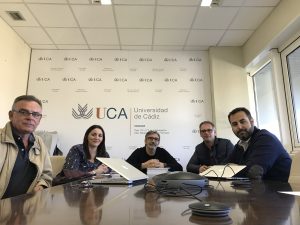Reunión del Grupo de Política Marítima 7 November 2017

Dentro del programa de trabajo, investigadores del Grupo de Política Marítima (TEP-194), liderado por el profesor Francisco Piniella Corbacho, mantuvieron una reunión el pasado 7 de noviembre, con el objetivo de establecer las futuras estrategias en el diseño de las líneas de transporte marítimo-fluviales del proyecto ESPOmar. Pese a ser una reunión preparatoria de la actividad encomentada al TEP-194, en la misma se analizaron las condiciones de navegabilidad entre las diferentes poblaciones y su relación con las posibles zonas de interés turístico y comercial, que plantea el área geográfica del proyecto. Quedan por delante meses de duro de trabajo para el desarrollo y el análisis: los accesos y limitaciones físicas existentes en las infraestructuras portuarias, la normativa marítima y fluvial aplicable; así como, los requerimientos operativos que deberán cumplir las embarcaciones que operen en las líneas marítimas propuestas.

